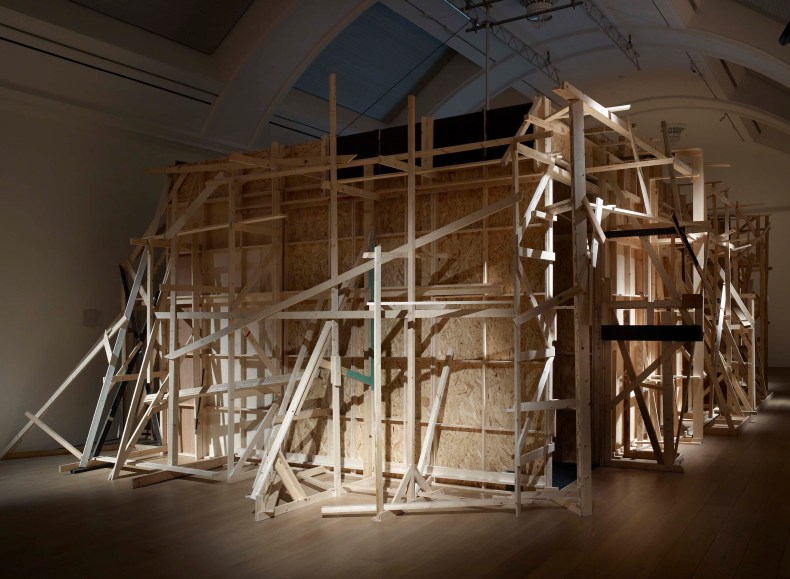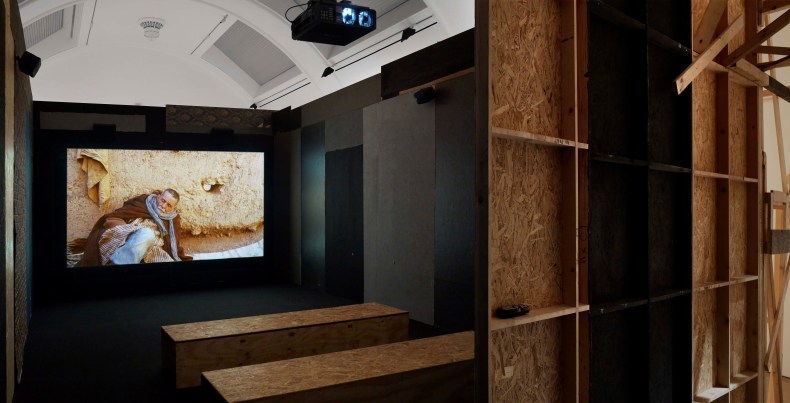Ben Rivers is a self-taught filmmaker, and his show ‘The Two Eyes Are Not Brothers’ at the Whitworth in Manchester is largely about the peculiarity of his profession. It consists of five short films, each revolving around stories of Morocco told by three European filmmakers, a native oral storyteller, and an American writer. They are screened in rough plywood structures – littered with instructions in felt-tip pen, pasted with scraps and strips of wallpaper – that mimic the film sets found abandoned in the Moroccan desert.
The works are loosely connected not only by country, but by the unsettling novel A Distant Episode. Written by Paul Bowles in 1947, it tells the story of a French language professor who is abducted by bandits in the Sahara. They cut out his tongue and force him to dance for their entertainment in a head-to-toe outfit made out of tin-can lids, stripping him at once of his profession, his identity, and any means of escape. Its strange cruelty lodged itself in Rivers’ mind years before he decided to use it in his art.

‘The Two Eyes Are Not Brothers’ installed at the Whitworth, 2016. Photo: Michael Pollard. Courtesy the Whitworth
With the exception of Mrabet, in which the 79-year-old Moroccan writer and artist Mohammed Mrabet tells anecdotes to the camera, there is a wilful lack of linear narrative in each of the exhibited films. The rest are shot on the sets of three films being made in Morocco: the feature-length The Sky Trembles and the Earth is Afraid and the Two Eyes Are Not Brothers directed by Rivers, Las Mimosas directed by his friend Oliver Laxe, and Towards the Possible Film by the artist Shezad Dawood. Much of the footage is behind-the-scenes, and some is simply unedited lab roll, so the clapperboard, chatter behind camera, shouted instructions, retakes – even a close-up of an attentive, anxious Laxe watching a scene – are all there.
Links stretch laterally between the films, joining fiction unpredictably with reality. Rivers’ feature film, for instance, is based directly on A Distant Episode. In his version, the academic has become a film director; the person dancing in the clanking tin-can costume in his film is Laxe. Paul Bowles was himself friendly with Mrabet when he lived in Tangier, translating his stories and later publishing them in English. In the eponymous film, Mrabet tells his stories to a young actor from Laxe’s Las Mimosas.

‘The Two Eyes Are Not Brothers’ installed at the Whitworth, 2016. Photo: Michael Pollard. Courtesy the Whitworth
The rawness of the films and their haphazardly built screening rooms convey some of the artifice of filmmaking, the bizarreness of the impulse to make these elaborate, temporary worlds, and the hierarchies they induce. A Distant Episode’s cautionary tale adds force to the questions they raise. Who chooses whether a story should be told, and how does its telling change its meaning? What is it that makes a story believable?
Unfortunately, there is a reason some footage ends up on the cutting room floor. The mundane aspects of filmmaking – the slow construction of a shot, the monotonous retakes, the incongruous sequence of scenes – are generally dull to watch. There are only a few places in these films where such exposure is memorable: the glimpses of the rapport between the crew and the actors, for instance, or how seeing the boxes piled up under a cliff for an actor to fall onto renders a dramatic scene comically banal.

‘The Two Eyes Are Not Brothers’ installed at the Whitworth, 2016. Photo: Michael Pollard. Courtesy the Whitworth
There is, however, a missing layer to this story. ‘The Two Eyes Are Not Brothers’ was commissioned by Artangel and originally installed in the vacant BBC drama studios of the Television Centre in White City last summer. The vast, deserted workshops, echoing with history, would have added a crucial unifying context to the project, strengthening the connections between each work.
The recently revamped Whitworth galleries offer some compensation: their clean white walls emphasise the roughness of the plywood installations; the tin-can costume is on show among a ‘Revolutionary Textiles’ display; a short, simple outtake of a Moroccan actor travelling in a taxi, looking furtively back at the camera, is projected into the middle of the gallery’s portraiture collection. But seen in an art gallery, this examination of the fabricated contexts and narratives that lie behind all films and stories ends up revealing just how much those structures are missed when they are not there.
‘Ben Rivers: The Two Eyes Are Not Brothers’ is at the Whitworth, Manchester, until 22 May.













![Masterpiece [Re]discovery 2022. Photo: Ben Fisher Photography, courtesy of Masterpiece London](http://zephr.apollo-magazine.com/wp-content/uploads/2022/07/MPL2022_4263.jpg)
‘Like landscape, his objects seem to breathe’: Gordon Baldwin (1932–2025)